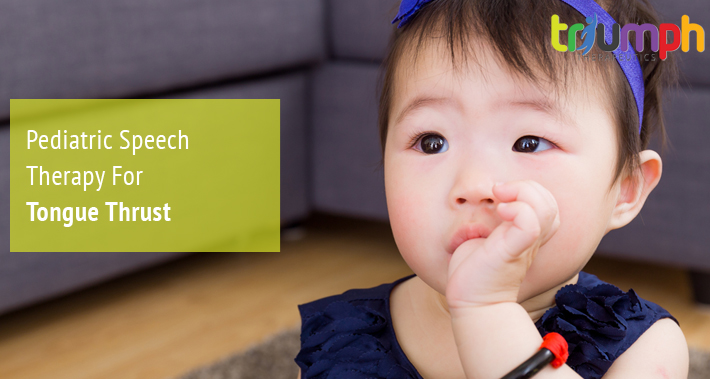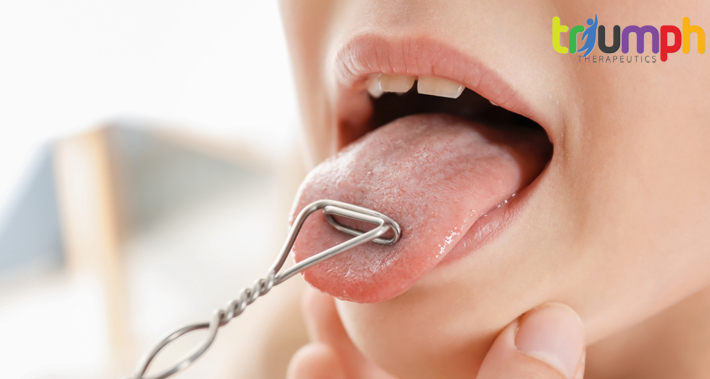Pediatric Speech Therapy For Tongue Thrust
https://www.triumphtherapeutics.com/wp-content/uploads/2021/12/Triumph-Therapeutics-Speech-Therapy-OT-Physcial-Therapist-Washington-DC-Nov02-01-2021.jpg 710 379 Triumph Therapeutics Triumph Therapeutics https://www.triumphtherapeutics.com/wp-content/uploads/2021/12/Triumph-Therapeutics-Speech-Therapy-OT-Physcial-Therapist-Washington-DC-Nov02-01-2021.jpgIf your child has issues which seem to be connected to their mouth, teeth, or tongue there could be a number of reasons for it.
Issues such as cleft lip/cleft palate, autism spectrum disorder, apraxia of speech, tongue tie, and tongue thrust can all benefit from speech therapy.
If you’re looking for a Washington DC pediatric speech and language therapy provider, you’re in the right place.
We’re Triumph Therapeutics, and today we’re going to help you get a better understanding of tongue thrust – it’s causes, how to recognize it, and some of the ways speech therapy can help.
Keep reading to learn more.
What Is Tongue Thrust?
Tongue thrust occurs when your child’s tongue is pushed (or “thrusted”) against the lips in order to create a seal with their mouth.
The purpose of this seal is to help them swallow, and is fairly normal in babies, especially when they are chest fed or bottle fed, as this movement helps them feed properly.
In most children, as they grow older and their feeding habits change, this generally stops.
If tongue thrust continues past age four, it can lead to issues including overbite and other tooth alignment issues, as well as issues related to speech development.
What Causes Tongue Thrust?
Some potential causes of tongue thrust include:
- Poor habits related to swallowing
- Tongue tie (a congenital condition which restricts the tongues range of motion)
- Thumb sucking
- Lip or nail biting
- Enlarged tongue or tonsils
- Heredity
- Allergies
- Structural issues
- Grinding or clenching of the teeth/jaw
- Nasal congestion
Tongue Thrust Symptoms And Complications
Some ways to tell if your child has tongue thrust include watching for the following:
- Eating which is either faster or slower than normal
- Messy eating
- A speech impediment – especially difficulty with the letters S and/or Z
- Tip of the tongue visible when speaking, swallowing, or resting
- Unable to completely close their lips
- Breathing through the mouth
If tongue thrust goes untreated, it can lead to crooked teeth.
Pressure from the tongue against the teeth can produce an open bite or a gap in the teeth.
Long term, untreated tongue thrust can also result in a lisp, and elongation of the facial shape.
Diagnosing Tongue Thrust
If you suspect tongue thrust, there are a number of healthcare professionals who may be involved in providing a diagnosis.
This includes pediatricians, dentists, orthodontists, ear, nose and throat specialists, and yes, speech therapists.
The speech therapy evaluation process involves watching how your child speaks, as well as how they swallow.
The practitioner may also hold down your child’s lip, in order to view the placement of the tongue during swallowing.
In some cases, multiple medical professionals may be needed to be involved in the diagnosis process, and will play a role in any subsequent treatment plans.
Speech Therapy Treatments For Tongue Thrust
If your child is diagnosed with tongue thrust, working with a speech therapist can help correct issues to help prevent complications later on in life.
One type of treatment which can be performed by certified speech therapists is orofacial myofunctional treatment, which helps to correct the placement of the tongue, lips, and jaw.
Therapy for tongue thrust can be used to help resolve issues related to swallowing, as well as speech therapy to correct speech impediments which may have developed.
If the main complication of tongue thrust is related to swallowing, the treatment will likely be relatively simple and short.
When there are issues with articulation, however, the treatment will generally take longer.
Regardless of the specific issues, tongue thrust is a treatable condition and most people will be able to make a full recovery.
Book An Appointment With Triumph Therapeutics
Have you noticed your child having issues with messy eating (more so than what you might expect for their age)?
Or are they starting to speak, and you’re noticing speech issues or difficulties (in particular with the letters S and Z).
These are just a few of the tell tale signs of tongue thrust, but with the help of medical professionals, including speech therapists, this is a highly treatable condition.
If you’re looking to seek out a diagnosis for tongue thrust, we’re Triumph Therapeutics, and we can help.
In many cases, tongue thrust is a result of poor swallowing, and as with any habit the sooner you can start to work on it, the easier it will be to eliminate.
Therefore, don’t delay in contacting our office today to set up a consultation for diagnosis and treatments of tongue thrust.


